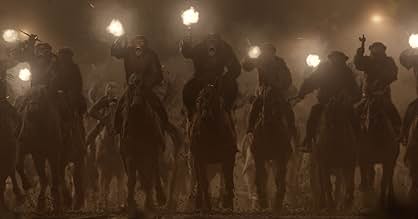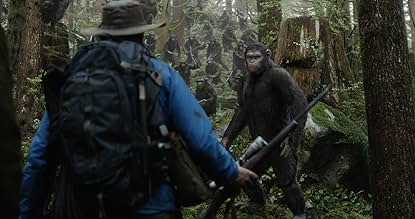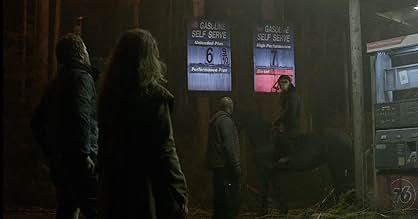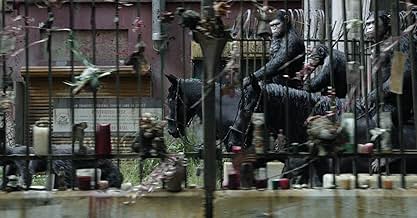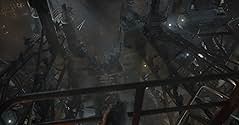La planète des singes : L'affrontement
Titre original : Dawn of the Planet of the Apes
- 2014
- Tous publics
- 2h 10min
Une tribu de singes génétiquement évolués, dirigée par César, croise des survivants humains du virus dévastateur surgi il y a dix ans. Mais méfiance et trahison menacent de les plonger dans ... Tout lireUne tribu de singes génétiquement évolués, dirigée par César, croise des survivants humains du virus dévastateur surgi il y a dix ans. Mais méfiance et trahison menacent de les plonger dans une guerre pour la domination de la Terre.Une tribu de singes génétiquement évolués, dirigée par César, croise des survivants humains du virus dévastateur surgi il y a dix ans. Mais méfiance et trahison menacent de les plonger dans une guerre pour la domination de la Terre.
- Nommé pour 1 Oscar
- 17 victoires et 48 nominations au total
Larramie Doc Shaw
- Ash
- (as Doc Shaw)
Histoire
Le saviez-vous
- AnecdotesThe film takes place in 2026.
- GaffesWhen the hydro electricity supply is turned on, the humans say they can now contact other humans on the radios, yet they already had electricity supplied by diesel-powered generators.
- Crédits fousAfter the credits there is an audio cue of Apes digging through, and removing rubble and concrete. Then Koba's distinctive breathing is heard, hinting at Koba surviving the fall after his struggle with Caesar.
- ConnexionsFeatured in Film '72: Épisode datant du 5 mars 2014 (2014)
- Bandes originalesThe Weight
Written by Robbie Robertson
Performed by The Band
Courtesy of Capitol Records, LLC
Under license from Universal Music Enterprises
Commentaire à la une
9.5
Sequels often carry the heavy burden of expectations, and few films manage to meet these expectations, let alone surpass them. However, "Dawn of the Planet of the Apes" not only meets the criteria of a great sequel but exceeds them in remarkable ways. This cinematic gem, directed by Matt Reeves, expertly continues the story set in motion by its predecessor, "Rise of the Planet of the Apes." What sets "Dawn" apart is its intelligent storytelling, superb character development, and breathtaking visual effects, which collectively elevate it to the ranks of cinematic excellence.
One of the most commendable aspects of "Dawn" is its strategic decision to shift the focus primarily onto the apes. While the human characters in "Rise" were not inherently flawed, they felt somewhat generic, lacking the depth and nuance needed to fully engage the audience. "Dawn" rectifies this flaw by wisely sidelining most of the human characters from "Rise" and bringing the apes to the forefront. This shift not only provides a fresh perspective but also allows for a more profound exploration of the ape society, their emotions, and their struggles.
What truly distinguishes "Dawn of the Planet of the Apes" is its thematic depth. The film seamlessly weaves together complex themes, including survival, leadership, prejudice, and the consequences of human actions on the environment. These themes are not merely brushed upon but are deeply embedded in the narrative, prompting viewers to reflect on the intricacies of human nature and the choices we make as a species. The movie's ability to tackle such weighty themes with finesse is a testament to the skillful craftsmanship of the filmmakers.
Furthermore, the film boasts some of the most impressive visual effects ever witnessed on the big screen. The seamless integration of motion capture technology to bring the apes to life is nothing short of astonishing. Every nuance of emotion, every subtle facial expression is captured with remarkable accuracy, making the audience forget that they are watching CGI creations and instead, empathize deeply with the characters. In particular, the performances of Andy Serkis as Caesar and Toby Kebbell as Koba are nothing short of masterful. Their ability to infuse these digital creations with genuine emotions and humanity is a testament to their acting prowess.
The brilliance of "Dawn of the Planet of the Apes" is not confined to its individual success alone but extends to its impact on the franchise as a whole. The film, along with its subsequent sequel, "War for the Planet of the Apes," revitalized the franchise, breathing new life into a classic series. This resurgence catapulted the "Planet of the Apes" franchise into my personal top 10 list of all time. In conclusion, "Dawn of the Planet of the Apes" stands as a shining example of what a sequel should aspire to be. It delves deep into its characters, explores profound themes, and dazzles the audience with its visual splendor. This film is a testament to the power of storytelling and the limitless possibilities of cinema, leaving an indelible mark on the hearts and minds of viewers, myself included.
One of the most commendable aspects of "Dawn" is its strategic decision to shift the focus primarily onto the apes. While the human characters in "Rise" were not inherently flawed, they felt somewhat generic, lacking the depth and nuance needed to fully engage the audience. "Dawn" rectifies this flaw by wisely sidelining most of the human characters from "Rise" and bringing the apes to the forefront. This shift not only provides a fresh perspective but also allows for a more profound exploration of the ape society, their emotions, and their struggles.
What truly distinguishes "Dawn of the Planet of the Apes" is its thematic depth. The film seamlessly weaves together complex themes, including survival, leadership, prejudice, and the consequences of human actions on the environment. These themes are not merely brushed upon but are deeply embedded in the narrative, prompting viewers to reflect on the intricacies of human nature and the choices we make as a species. The movie's ability to tackle such weighty themes with finesse is a testament to the skillful craftsmanship of the filmmakers.
Furthermore, the film boasts some of the most impressive visual effects ever witnessed on the big screen. The seamless integration of motion capture technology to bring the apes to life is nothing short of astonishing. Every nuance of emotion, every subtle facial expression is captured with remarkable accuracy, making the audience forget that they are watching CGI creations and instead, empathize deeply with the characters. In particular, the performances of Andy Serkis as Caesar and Toby Kebbell as Koba are nothing short of masterful. Their ability to infuse these digital creations with genuine emotions and humanity is a testament to their acting prowess.
The brilliance of "Dawn of the Planet of the Apes" is not confined to its individual success alone but extends to its impact on the franchise as a whole. The film, along with its subsequent sequel, "War for the Planet of the Apes," revitalized the franchise, breathing new life into a classic series. This resurgence catapulted the "Planet of the Apes" franchise into my personal top 10 list of all time. In conclusion, "Dawn of the Planet of the Apes" stands as a shining example of what a sequel should aspire to be. It delves deep into its characters, explores profound themes, and dazzles the audience with its visual splendor. This film is a testament to the power of storytelling and the limitless possibilities of cinema, leaving an indelible mark on the hearts and minds of viewers, myself included.
Meilleurs choix
Connectez-vous pour évaluer et suivre la liste de favoris afin de recevoir des recommandations personnalisées
Détails
- Date de sortie
- Pays d’origine
- Langues
- Aussi connu sous le nom de
- El planeta de los simios: confrontación
- Lieux de tournage
- Sociétés de production
- Voir plus de crédits d'entreprise sur IMDbPro
Box-office
- Budget
- 170 000 000 $US (estimé)
- Montant brut aux États-Unis et au Canada
- 208 545 589 $US
- Week-end de sortie aux États-Unis et au Canada
- 72 611 427 $US
- 13 juil. 2014
- Montant brut mondial
- 710 644 566 $US
- Durée2 heures 10 minutes
- Couleur
- Mixage
- Rapport de forme
- 1.85 : 1
Contribuer à cette page
Suggérer une modification ou ajouter du contenu manquant







